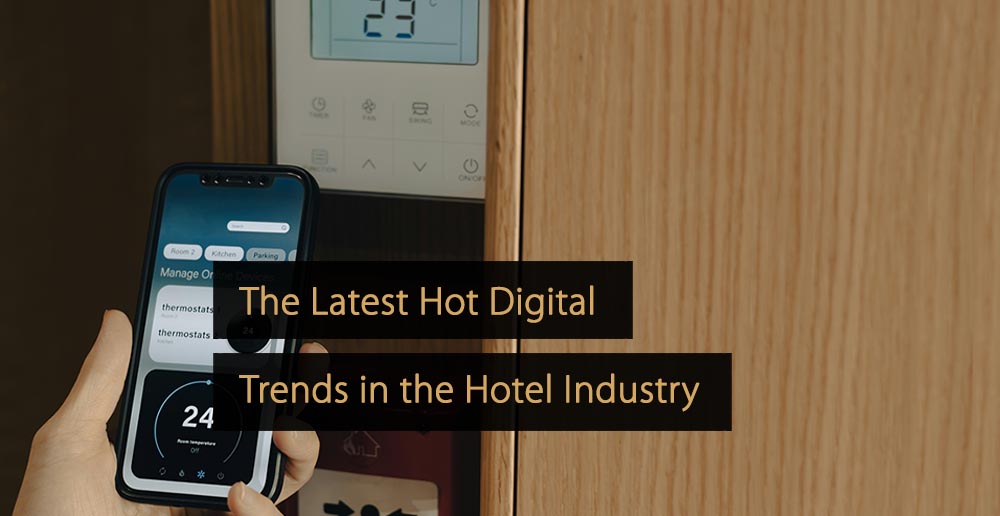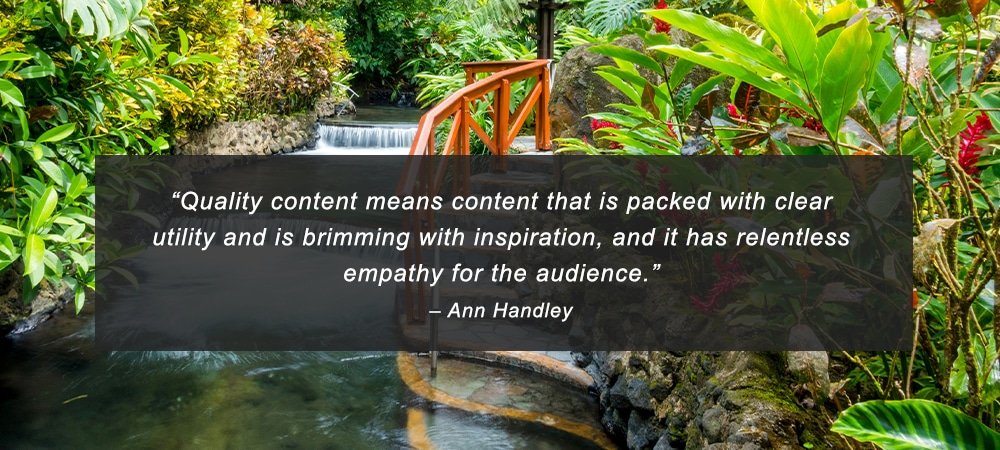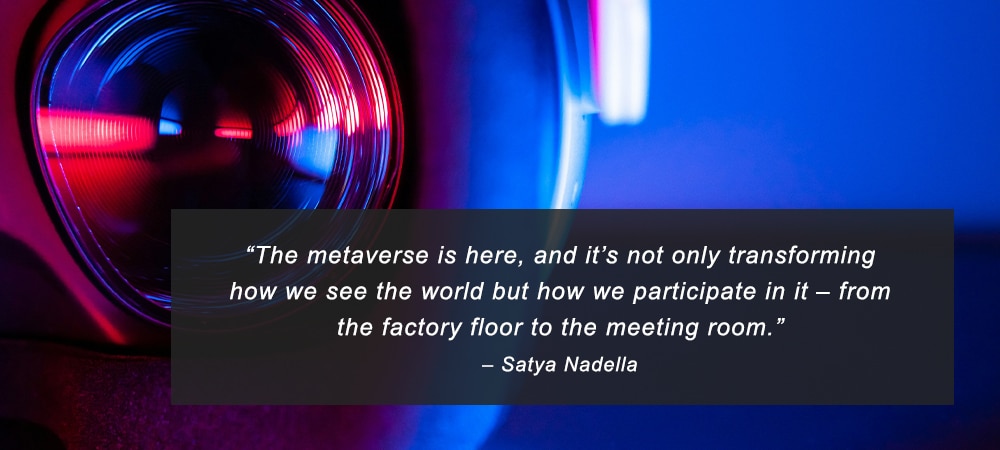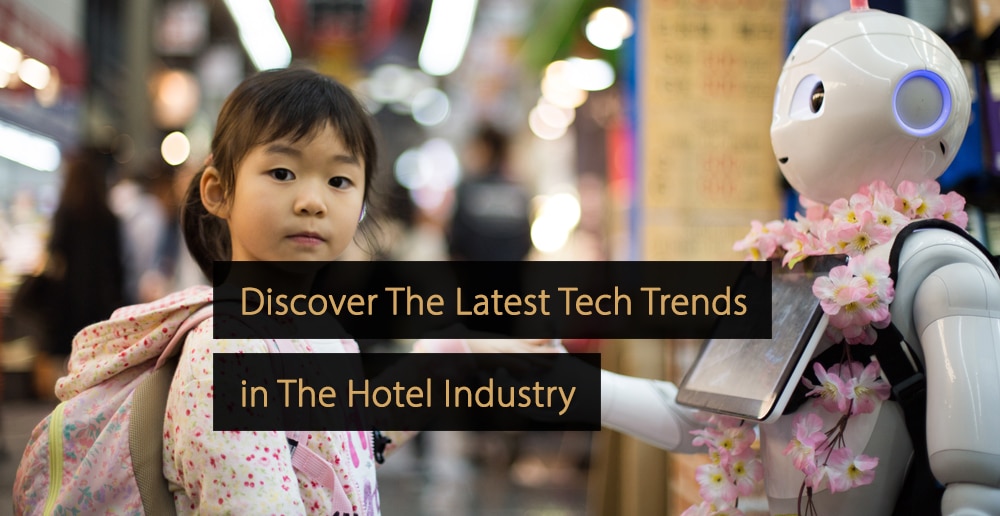With digital technology continuously evolving, it should come as little surprise that its applications within the hotel industry evolve, too. Indeed, over the past few years, several notable digital trends have taken the industry by storm, and the year ahead promises to be no different. Crucially, the businesses that benefit most from using digital technology are those with the foresight to get in on the ground floor. So, with that in mind, here are eleven important digital trends for the hotel industry.
Table of Contents:
- 20 Hot Digital Trends for the Hotel Industry of 2025
- 1. Hotel Application of the Internet of Things
- 2. Artificial Intelligence in Hotel Marketing & Operations
- 3. Energy-Saving Solutions
- 4. AI-Powered Chatbots
- 5. Data Analytics
- 6. The Rise of VR
- 7. Augmented Reality
- 8. Cybersecurity
- 9. Hotel Apps
- 10. Smart Hotel Technology
- 11. Facial Recognition
- 12. Mobile Integration With Hotel Operations
- 13. Contactless Payments
- 14. Hotel Robots
- 15. Video Content
- 16. Wearables
- 17. Hospitality TV
- 18. Content Marketing
- 19. How the Metaverse Factors Into Digital Trends Hotel
- 20. NFTs As a New Hot Digital Hotel Trend
- More Digital Trends in Related Industries
20 Hot Digital Trends for the Hotel Industry of 2024
Below are the current digital trends prevalent and trending in the hotel industry in 2024.
1. Hotel Application of the Internet of Things
The Internet of Things (IoT) refers to everyday devices fitted with internet connectivity and data-sharing capabilities. Within the hotel industry, IoT technology is used in a number of exciting ways. It is becoming more common to see smart speakers and smart controls within rooms, while smart room keys are sometimes used instead of physical keys.
IoT technology is one of the most critical digital trends hotel industry leaders need to focus on because as it becomes more prevalent, it is going to become an expected part of hotel service. A good example is smart temperature controls, allowing customers to set a preferred temperature for their room on a mobile app. The hotel can then make use of IoT technology to continuously and automatically regulate heating and air conditioning systems.
Video: Internet of Things in Hotels
2. Artificial Intelligence in Hotel Marketing & Operations
AI technology is disrupting industries worldwide and is among the top digital trends hotel industry businesses need to be aware of. In particular, it is being used by hotels to create marketing content, assist with customer service, and streamline operations in order to boost overall business efficiency.
In the “How to Use Artificial Intelligence in the Hospitality Industry“ guide, you can find an overview of what AI is and how it works, along with examples of its specific benefits and use cases within the hotel industry.
Video: Artificial Intelligence in Hotels
3. Energy-Saving Solutions
A number of the digital trends in the hotel industry are linked to energy-saving, with examples including smart meters and tools for remotely controlling thermostats. This makes it easier to reduce overall energy usage.
Remote access to energy controls makes it easier to avoid wasted energy usage, while smart meters make it easier to understand your energy usage in real-time and identify any anomalies in terms of total usage.
Energy-saving solutions have become a major point of interest for hotels, as they can save money and help to improve your green credentials. This is important in an era where guests are increasingly aware of issues around sustainability.
4. AI-Powered Chatbots
AI-powered chatbots are software tools that are able to simulate human-to-human online interactions. Using artificial intelligence, the chatbot can interpret questions and queries and provide answers.
Chatbots have emerged as one of the fastest-growing digital trends in the hotel industry because they can respond to customers almost instantly. Chatbots can also provide responses 24 hours a day.
A chatbot on your hotel website can be used to collect customer data, such as names and email addresses. The chatbot can also serve a customer service function, reducing the workload for hotel employees.
5. Data Analytics
The current age of “big data” makes analytics a critical digital trend hotel industry figures must understand. Modern hotels need to continually track key performance indicators and customer data and attempt to extract valuable insights.
Analytics can influence everything from pricing and distribution strategies, to customer service and hotel amenities. The insights gained can make it easier to understand what is working and where improvements can be made.
AI technology is making analytics easier than ever, as many useful insights can now be extracted automatically and as close to real-time as possible. This gives employees more time to actually act on the insights.
6. The Rise of VR
The virtual reality market has grown rapidly over the past year, thanks to the release of devices like the Oculus Rift, Samsung Gear VR, and PlayStation VR, but the best is yet to come, according to the Virtual Reality Market Report by Fact.MR, the global virtual reality market, is projected to reach $233.79 billion by 2033. For the hospitality industry, VR offers almost limitless potential. Before long, we could be living in a time when it is commonplace for people to visit a virtual recreation of a hotel and explore it digitally before making a booking.
Video: PS VR2
Find more detailed information and examples about how virtual reality can benefit your business in the articles “How Virtual Reality is Transforming the Travel Industry” and “10 Amazing Examples of Virtual Reality Hotel Tours”.
7. Augmented Reality
Augmented reality technology involves digital overlays over a user’s view of real-world environments. It can provide interactive experiences that combine real surroundings with engaging or informative digital content.
This technology is becoming one of the most exciting digital trends in the hotel industry, helping to enhance guest experiences. For instance, in some hotels, a user can now point their smartphone at a map of the local area and see useful digital information about nearby attractions and places of interest. AR technology can also be used to educate and entertain, with options to enhance business meetings held in hotels, digitally enhance photographs, and more.
8. Cybersecurity
The various digital trends in the hotel industry have all helped to make cybersecurity more important than ever before. At the same time, cybercriminals are using increasingly sophisticated attack methods.
There are many different elements of cybersecurity that need to be managed, including offering secure Wi-Fi, protecting against cyber attacks, and backing up data. Failing to protect a hotel can lead to highly costly downtime.
Some of the specific areas to focus on include cyber security awareness training and cloud technology, which can be used to back up valuable data. It is also important to keep systems and software up-to-date.
9. Hotel Apps
Hotel apps are dedicated mobile apps, which provide access to information and services relevant to the hotel a guest is staying in. The creation of hotel apps is one of the major digital trends in the hotel industry today.
Hotel apps can be used for a variety of purposes, including personalization, communication with guests and facilitating contactless check-ins. The prevalence of smartphones makes them extremely valuable.
In the “Hotel App: Optimize Your Guest Communication, Experience & Revenue” article, you can access much more information on what a hotel app is and how it can be used to benefit your hotel and your guests.
10. Smart Hotel Technology
Smart hotel technology refers to the use of devices that are able to communicate with or send data to other devices, using the internet. This is sometimes described as the ‘Internet of Things’.
Examples of smart devices include smart TVs, smart thermostats, smart lighting systems, and smart locks. For example, smart locks and smart lighting systems may be controlled by a smartphone connected to the internet.
A smart hotel can provide remote access options and operational advantages for hotel staff. It is also one of the most essential digital trends in the hotel industry for providing personalization to guests.
11. Facial Recognition
Facial recognition technology works by automatically identifying people based on their facial features. This has emerged as one of the most useful digital trends in the hotel industry due to its functions in hotel security.
Using facial recognition technology, hotels can potentially provide options for contactless check-ins. The technology can also be used for door entry systems for the hotel itself or for guest rooms.
When deployed effectively, facial recognition technology can make the arrival process faster and can reduce friction in general. However, it is important to ensure biometric data is kept secure and deleted when it is no longer needed.
12. Mobile Integration With Hotel Operations
Mobile devices are at the very heart of many digital trends in the hotel industry, and for good reason. A large number of customers now expect to be able to book their travel, manage their check-ins, pay for services, and access other valuable information from their smartphones, and hotels need to live up to these expectations.
This means ensuring that your website is mobile optimized, that your booking engine works well on mobile devices, and that you are providing appropriate services through a mobile app. On top of this, mobile devices can be used in conjunction with cloud-based POS systems, providing portable points of sale within your business.
Table: Examples of Mobile Areas of Implementation
13. Contactless Payments
Few digital trends in the hotel industry are as crucial as contactless payments. According to the Contactless Payments: Key Opportunities, Emerging Trends & Market Forecasts by Juniper Research, the value of contactless payments will reach $10 trillion by 2027. Not only can contactless payments reduce friction and make the payment process more convenient, but the technology also took on a whole extra level of value in the wake of the COVID-19 pandemic, with a heightened focus on issues like hygiene and social distancing. Read “Contactless Payments Are Becoming More Important Within Hospitality“ for a more comprehensive overview of the value of accepting contactless payments and the reasons for their increased importance.
Video: How Does Contactless Work?
14. Hotel Robots
Hotel robots are one of the most exciting digital trends hotel industry figures can face. While this sounds like future technology, robots are already being used effectively. Robotics can be used to clean, greet guests, and even deliver room service orders. In the article “Hotel Robots: An Overview of Different Robots Used in Hotels“, you will be able to explore the uses of robotics in more detail, learn about some of the hotels currently making use of hotel robots, and explore the advantages and disadvantages of investing in this technology within your property.
Video: Hotel Robot Concierge
15. Video Content
Although video marketing is not a new trend, it is increasing in importance and will continue in 2017. From live video streaming to more traditional video advertising, there is no shortage of options for marketers. New avenues, including Facebook Live, will ensure video marketing continues to grow.
Social media sites like Facebook, Twitter, and Instagram all offer excellent video support, while YouTube report that mobile video consumption increases by 100 percent year-on-year. Moreover, Invodo has found that 92 percent of consumers share video content with others, offering a unique opportunity for those in hospitality.
16. Wearables
Finally, despite industry experts warning that user adoption of wearable technology has been slow, it is still likely to be one of the major digital trends in the hospitality sector. More importantly, once the wearables market grows sufficiently, hotels and resorts are among the best places to take advantage. Already, Disney World has innovated within this field, offering their Disney MagicBand, which guests can use in place of paper tickets to the park and key cards to their hotel room. Disney has also used this as a bonus to ensure more guests book directly through them, rather than through third parties.
17. Hospitality TV
A hospitality TV is a television set that has been specifically designed for use in hospitality businesses. These TVs provide customization tools and options allowing hotels to control the content available for guests.
The use of hospitality TVs allows hotels to decide on the promotional content is displayed. In many cases, multiple TVs can be managed from one place, rather than having to set up and manage each TV separately.
In the “Hospitality TV: Key Benefits and How They Differ From Domestic TVs” article, you can learn all about hospitality TVs and their benefits and explore why they are one of the biggest digital trends for hotel industry businesses.
18. Content Marketing
As ever with digital marketing, content is king, and, in particular, editorial content is becoming vital when attracting guests. This is partly because holiday-makers no longer want to be sold a hotel room; they want to be sold an experience they will never forget. Visitors to a hotel website want to be inspired, so while it is important to showcase your hotel rooms, pool, and facilities, they need more. Possible content ideas include videos showing local attractions and holiday diaries written by guests. Try to create content that positions your hotel as a crucial part of a much wider experience.
19. How the Metaverse Factors Into Digital Trends Hotel
Of all the digital trends, hotel owners and decision-makers are capitalizing on, virtual reality may have the greatest potential, especially when it is used to make the metaverse a reality. This describes three-dimensional, metaverse virtual words, where people can interact with one another, powered by VR, augmented reality, and similar tech. You can find out much more about what the metaverse is, how it is defined, how those in the hotel industry are using it, its potential for the future, and ideas for how businesses in the hotel industry can maximize their investment by reading “How Can the Hotel Industry Take Advantage of the Metaverse?”.
20. NFTs As a New Hot Digital Hotel Trend
NFTs, or non-fungible tokens, are another of the digital trends that hotel industry figures need to focus on. These tokens are proof of ownership of a unique digital asset, which can relate to images, videos, or even digital accounts. As a result, NFTs can be used for hotel marketing and customer loyalty programs. In the article “NFT Hotel Opportunities: How Hotels Could Use NFT Technology“, you can learn more about this technology and how it can be harnessed to benefit those in the hotel industry.
More Digital Trends for the Hotel Industry
Hotel marketing and Hotel management are constantly evolving as new digital technology emerges. In the article “Key Digital Trends in the Hospitality Industry”, we explore some of the digital trends that are going to be most significant in the industry: from virtual reality, which is changing the booking process, to augmented reality, which is enhancing the in-person experience, to artificial intelligence, which is fundamentally changing customer service.
Digital Trends in Hotel Industry FAQs
Did You Like This Article About Digital Trends in the Hotel Industry?
You might also be interested in the following articles about digital trends in related industries:
- Key Digital Trends in the Hospitality Industry
- Hot Digital Trends in the Travel Industry
- The Latest Technology Trends in the Hospitality Industry
- Hot Digital Trends in the Tourism Industry
- Key Technology Trends Emerging in the Travel Industry
More Tips to Grow Your Business
Revfine.com is the leading knowledge platform for the hospitality and travel industry. Professionals use our insights, strategies, and actionable tips to get inspired, optimize revenue, innovate processes, and improve customer experience.Explore expert advice on management, marketing, revenue management, operations, software, and technology in our dedicated Hotel, Hospitality, and Travel & Tourism categories.










Leave A Comment